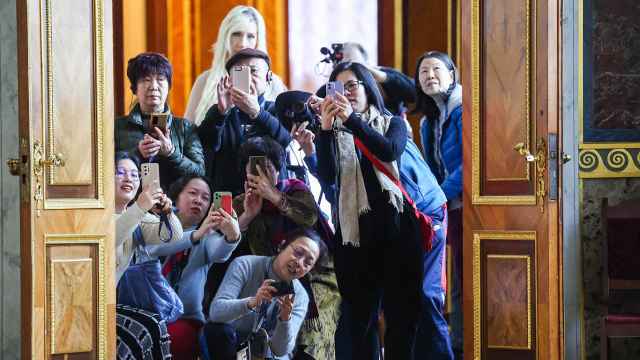Almost half of all Georgians support Mikheil Saakashvili's National Movement Party, according to a recently leaked poll commissioned by the National Democratic Institute. There's one problem with the poll, though. The Caucasus Research Resource Centers, which conducted the field survey, cannot guarantee the fidelity of the respondents. There is reason to believe people are afraid to tell the truth.
Forty-seven percent of the respondents said they would vote for the National Movement Party if parliamentary elections were held tomorrow, while only 10 percent said they would vote for Bidzina Ivanishvili's Georgian Dream party.
In the regions, people say they are afraid to openly criticize the Saakashvili government. Those who are employed fear losing their jobs. Small business owners dread a visit from the tax police. When a stranger knocks on their door with a clipboard and asks, "If parliamentary elections were held tomorrow, who would you vote for?" they might tell the stranger what they think he wants to hear. Or they might be one of the 10 percent who refused to answer or the 23 percent who were undecided.
Nevertheless, of all political surveys in Georgia, the National Democratic Institute poll is the best barometer of public attitudes that we have. While the government spins its favorable 47 percent, it is also aware that 65 percent of the people surveyed said they disapproved of stripping Ivanishvili of his citizenship and 70 percent wanted it reinstated.
The National Movement might do well to heed the numbers. Many of the 70 percent who identified themselves as unemployed said they have been promised a lot but only see new police stations in their towns and villages. The new roads are great, but the economic progress they hear so much about on television means they can't afford increasing prices for gasoline, food and utilities. These are the people who will vote for Ivanishvili because he hasn't had the opportunity to let them down yet.
If the National Movement wants to win over voters, it should address their needs and not pretend that it knows what is best for them. It should stop intimidating people to not oppose it, because in a democracy you can't eat fear and love off the same plate.
Paul Rimple is a journalist in Tbilisi.
A Message from The Moscow Times:
Dear readers,
We are facing unprecedented challenges. Russia's Prosecutor General's Office has designated The Moscow Times as an "undesirable" organization, criminalizing our work and putting our staff at risk of prosecution. This follows our earlier unjust labeling as a "foreign agent."
These actions are direct attempts to silence independent journalism in Russia. The authorities claim our work "discredits the decisions of the Russian leadership." We see things differently: we strive to provide accurate, unbiased reporting on Russia.
We, the journalists of The Moscow Times, refuse to be silenced. But to continue our work, we need your help.
Your support, no matter how small, makes a world of difference. If you can, please support us monthly starting from just $2. It's quick to set up, and every contribution makes a significant impact.
By supporting The Moscow Times, you're defending open, independent journalism in the face of repression. Thank you for standing with us.
Remind me later.





